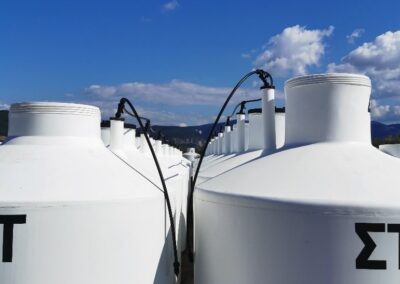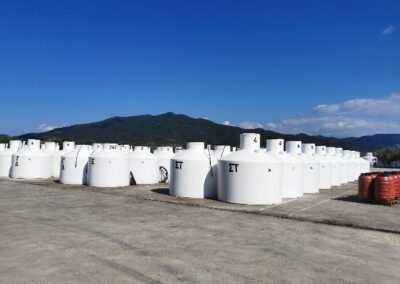Experiments
Table Olives Fermentation control through Internet of Things technologies
Greece, Region of Western Greece, Region of Attica
![]() Hellenic FIWARE iHub
Hellenic FIWARE iHub
Experiment objective
TOFIoT offers a digital solution for monitoring quality control of table olives’ fermentation targeting small to large-scale manufacturers. It exploits IoT technology to measure biometric conditions within table olives’ fermentation tanks simplifying and modernizing the process. Considerable optimizations in labor efficiency are achieved since much less manual samples are needed.
Also, the tool provides unprecedented volume of data for process transparency and serves novel business models. Outsourced quality control experts can now scale their food technology business in non-proximate regions by maintaining their labor resources’ productivity. Additionally, fermentation will be assessed based on scientific tools in contrast to the usually encountered “do-it-yourself” tools, ancient or local experimental formulas.
To add, accuracy in data reporting is ensured through the envisioned software features of the solution. TOFIoT automates data entries and replaces errors that hinder an accurate data life cycle upstream when reported in paper. Last, a standardized RESTful API (GS1-compliant) integrates them to the manufacturer’s/ stakeholder’s traceability platform and meet the gradually stricter policies of the big retailers.
Challenges
- Ubiquitous Control of weather dependent risk for fermentation such as water temperature
- Ubiquitous Control 24×7 of critical fermentation parameters
- Compare sensor measurements with lab analyses
- Assess sensor data life cycle and accuracy of measurements throughout the experiment
- Assess mechanical and consumables parts (batteries, cleaning/ maintenance) of the IoT deployment throughout the experiment
Fermentation in table olives and other vegetables is a crucial step within the food value chain.
Table Olive food industry exploits fermented goods and further processes them by sterilizing, canning and packaging them to sellable units. Fermentation is a long-lasting uncertain process with associated costs and huge impact on the safety, durability and organoleptic traits of the final product. Inappropriate fermentation leads to production losses in Spring and Summer when the fermented produce is stored at the buyers premises.
It adds a 25%-75% extra time on top of the crop production lifecycle and thus it may delay the sourcing of the semi-final products or hinder its quality and value leading to unfair transactions and power imbalances within the value chain. TOFIoT develops a modern, digital solution for its quality control that optimises resources’ efficiency, impressively increases data availability and their scientific utilization and optionally shares data and information (through EPCIS) with other food processing systems and value-chain actors.
TOFIoT data records build trust on food safety and products’ shelf duration between the players of the 1st and 2nd processing phase that may be the same or different businesses. The solution acquires and communicates more data than physical inspections do so the process is largely optimized while fermentation material use and costs are decreased. Moreover, employees’ costs are also reduced and their productivity increased. Last, data availability feeds traceability platforms and shares food safety confidence with buyers and consumers.
Implementation Solution
TOFIoT replaces the manual samples taken either from accredited outsourced food technologists or manufacturer employees. These may be delayed or inaccurate causing production losses, they require physical activities imposing risks to personnel safety and cannot be consistently and easily documented so that fermentation process is traceable. Last, data analytics enable on-time addition of acids while final product deliveries will be synchronized with demand and existing planning systems.
Tanks, counted from decades to hundreds, are usually 2,5m height with a 3m diameter and they are usually located in rural areas. Thus, technicians and quality experts have to travel by car, use a ladder, climb won the top and take samples from every tank or use (Do-It-Yourself) handheld devices to measure and document the pH and salinity levels. TOFIoT will deploy more than 30 sensors to remotely monitor the fermentation conditions within at least 15 tanks in a safe, reliable and digital way. In this case, sensors will transfer their measurements to the attached IoT node and the node will wirelessly transfer them either to the network’s gateway (6LoWPAN version) or directly on Cloud (NBIoT version).
TOFIoT partners have the complementary expertise to make this digital solution a success in EU table olive sector.


